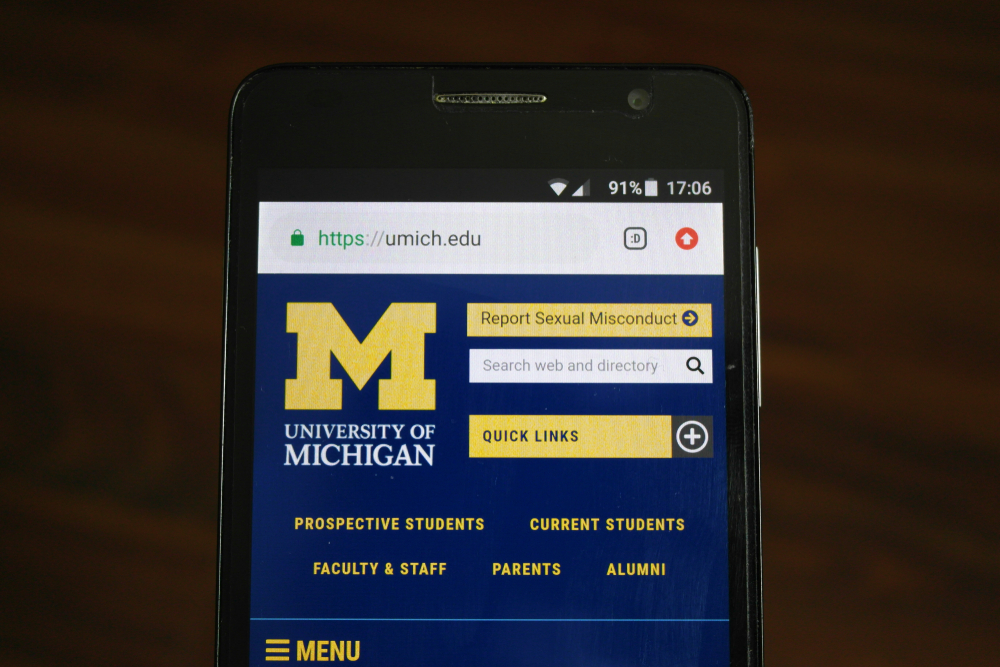The University of Michigan has produced many notable figures including U.S. President Gerald R. Ford, astronauts David Scott and James Irwin, who walked on the moon, and football great Tom Brady. However, more recently, the University of Michigan has become known for several high-profile sex abuse cases. Dr. Robert Anderson, a former University of Michigan doctor, is accused of abusing hundreds of students, mostly male athletes, and former Provost Martin Philbert sexually harassed subordinates as he made his way up the career ladder to the second-highest position on campus. Both are accused of abusing victims for decades.
University of Michigan Sex Abuse Lawsuits Bring Policy Changes
As the acclaimed university navigates through dozens of lawsuits centered around sexual abuse by its employees, school leaders are being forced to review old standards of operation and establish new directives and policies.
The newest policy came on Nov. 11. It is called “the Protection from Retaliation Policy.” According to an announcement released by the University of Michigan’s public affairs department, the standalone policy is designed to stop retaliation against those who choose to report wrongful conduct on campus. It took effect immediately.
According to the release, the policy “...prohibits acts or threats of retaliation, whether subtle or direct, that adversely affect employment or education as a result of making good-faith reports of wrongful conduct or participating in an investigation.’’
If the anti-retaliation policy is violated, a student will face expulsion from the school, and if the violator is an employee, they will be dismissed from their position.
The decision to create the policy came after an independent sexual misconduct investigation was completed on former Provost Philbert, who the University of Michigan employed from 1990 until his termination in 2020.
The investigation, conducted by the Wilmer Hale law firm, included interviews of more than 120 individuals associated with the school. Along with detailing Philbert’s wide range of sexual misconduct and the ways his inappropriate behavior was normalized, it also included Philbert’s intimidation practices against the women and reports by those around the professor who told of his misconduct and the university’s non-actions to correct the problems.
After the interviews and reviewing hundreds of documents, the law firm issued its final report to the school. At that time, it recommended further assistance by a consulting firm to help with necessary reforms for changing the culture around such sexual misconduct. The consulting firm Guidepost Solutions was hired and encouraged several changes, including the detailed Protection from Retaliation Policy, calling it “a national best practice.’’
The new policy is just one of many sweeping changes the school has made in recent months. Other developments include:
- A new Equity, Civil Rights and Title IX Office, which will be equipped with a director and staff
- A campus-wide working group on culture change to “create an environment of mutual respect and accountability that is free from retaliation”
- Revisions to the university’s policy on emeritus status, including a new process to revoke that status in cases of misconduct
- Updates to the university’s website making it easier to report misconduct
- A policy that now prohibits “romantic relationships with learners,’’ and a “best practice policy’’ for supervisor-employee relationships
Dr. Anderson Sex Abuse Scandal
While Philbert’s actions spurred the decision to hire Guidepost, he has not been the only employee accused of sexual misconduct. Horror stories of sexual abuse by Dr. Anderson are still reverberating around campus.
Although rumors concerning the doctor, who worked at the school from 1966-2003, had circulated for years, it wasn’t until early 2020 that it first became public that he sexually abused students. In the last 22 months, more than 900 Dr. Anderson victims have stepped forward. Many recount nightmare instances under the guise of medical treatment and examinations, including inappropriate fondling, unnecessary rectal and vaginal exams, and forced nudity. Former athletes have also gone on record saying Anderson’s abusive exams were well-known among University of Michigan students and coaches.
Some of Dr. Anderson’s sex abuse victims include two-time Super Bowl champion and former San Francisco 49er safety Dwight Hicks, Chuck Christian, who is a former tight end at the University of Michigan who played from 1977-1981 and was the first high profile football player to come forward, and the former University of Michigan running back Jon Vaughn who led the New England Patriots in rushing yards during their 1992 season. Vaughn has been holding constant vigils protesting the university’s alleged negligence throughout the fall.
News outlets, including the Michigan Daily, have been reporting cases of sexual abuse involving other University of Michigan employees as well. Peter Chen, former computer science department chair, is awaiting trial for first-degree criminal sexual misconduct. An associate professor of Electrical Engineering and Computer Science and a former assistant professor in Computer Science and Engineering at the university have also been accused of sexual misconduct by multiple people. Former School of Music, Theatre & Dance professors have also been criminally charged with sex crimes in recent years.
Although the sexual abuse allegations spurred the policy changes, the November announcement makes it clear the changes affect not only sexual misconduct but reports of wrongful conduct across the board, including “...actions or suspected actions that are illegal, fraudulent or violate university policies or procedures. That includes sexual and gender-based misconduct, fraud, academic or research misconduct, unauthorized use of university resources, dishonest financial reporting, bribery, and all forms of prohibited discrimination."
As for the process itself, after the individual reports the alleged wrongful conduct, university administration officials, "with expertise in the relevant area,'' will perform an investigation, the announcement said.












